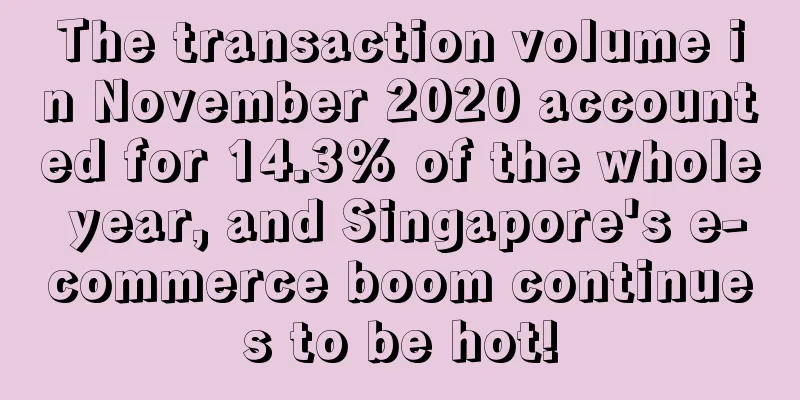The transaction volume in November 2020 accounted for 14.3% of the whole year, and Singapore's e-commerce boom continues to be hot!

|
Therefore, Singapore is also an e-commerce market that several international e-commerce giants are scrambling to get their hands on. Currently, Singapore has identified key e-commerce infrastructure that may pave the way for the development of global and regional e-commerce. It is understood that these infrastructures include the establishment of local 5G networks, supply chain functions and payment platforms. Other data showed that driven by the COVID-19 pandemic, online transactions in Singapore in November 2020 accounted for 14.3% of the total sales for the year, higher than 5.8% in January. Singapore's Minister of Industry and Trade said that even after Singapore lifted its lockdown facilities in mid-2020, consumers' online shopping levels remained high. This shows the strong development of online business in Singapore, and it is expected that consumers' shift to online shopping behavior will continue for a longer period of time. To continue this momentum, the Singapore government will improve capabilities in areas such as digital infrastructure, supply chain resilience, cybersecurity and cross-border alliances. For example, in recent years, Singapore has invested in digital connectivity, data analysis and payments to enhance its digital infrastructure, especially 5G networks, which may become the core of Singapore's digital economy. Singapore's Minister of Industry and Trade said that two nationwide 5G networks are planned to be up and running by 2025, and 5G network coverage will reach 50% by 2023 , which will enhance the ability of businesses doing business online to handle large e-commerce orders. In addition, the Singapore government has launched various assistance programs to help SMEs adopt digital technologies to conduct online business. Last year, the Singapore government also collaborated with e-commerce platforms such as Amazon to launch a number of programs, including an e-commerce booster package. In addition to basic software applications, logistics is also a focus of the government and small and medium-sized enterprises. Singapore's Minister of Industry and Trade said that Singapore's logistics sector also needs to enhance the adaptability of its supply chain to ensure that the requirements of all online orders are met. After all, during the epidemic, we all saw the impact of global supply chain disruptions caused by border closures and various export restrictions, as well as a series of logistics problems. policy Cross-border e-commerce market Singapore |
<<: South Korean retail giant E-Mart may form an alliance with South Korean IT giant Naver
>>: The number of shopping app sessions in the United States grew 66% in Q4 2020
Recommend
What is Velfix? Velfix Review, Features
Velfix provides users with a one-stop solution fo...
What is 旭日嘉辉? 旭日嘉辉Review, Features
Sunrise Jiahui (Ningbo Sunrise Jiahui Supply Chain...
With 3 billion visits per month, Amazon becomes the fifth most visited website in the world!
As an e-commerce giant, Amazon has attracted shop...
With over 580,000 SKUs on sale, Santai Shares suspends its IPO!
Under the influence of the epidemic, the cross-bo...
Indonesian fintech startup BukuWarung raises $60 million
Indonesian fintech startup BukuWarung has raised ...
Amazon’s second quarter report is out, with both revenue and profit exceeding expectations!
Amazon said the recovery in its e - commerce busi...
What is inDare? inDare Review, Features
<span data-docs-delta="[[20,{"gallery"...
What is IPCN Cross-border Intellectual Property? IPCN Cross-border Intellectual Property Review, Features
IPCN Cross-border Intellectual Property is a profe...
95% of people over 55 shop online regularly, and middle-aged and elderly people have become the main force of e-commerce growth
According to a new study , 95 % of people over 55...
The market is huge! Maternal and child products, toys and other categories are hot in Southeast Asia...
With the increasing number of smartphone users, t...
South Korea's e-commerce market to reach $325 billion by 2025
According to data research firm ResearchAndMarket...
What is Born to Run? Born to Run Review, Features
Born to Run is a new program launched by Amazon t...
TikTok launches UK's first 'For You' pop-up store in London
According to the British “Guardian” report, TikTo...
Annual sales of 2.6 billion, 9 accounts blocked
Recently, the Amazon account suspension incident ...
What is TrackMyOrders? TrackMyOrders Review, Features
TrackMyOrders is committed to providing Amazon dir...









